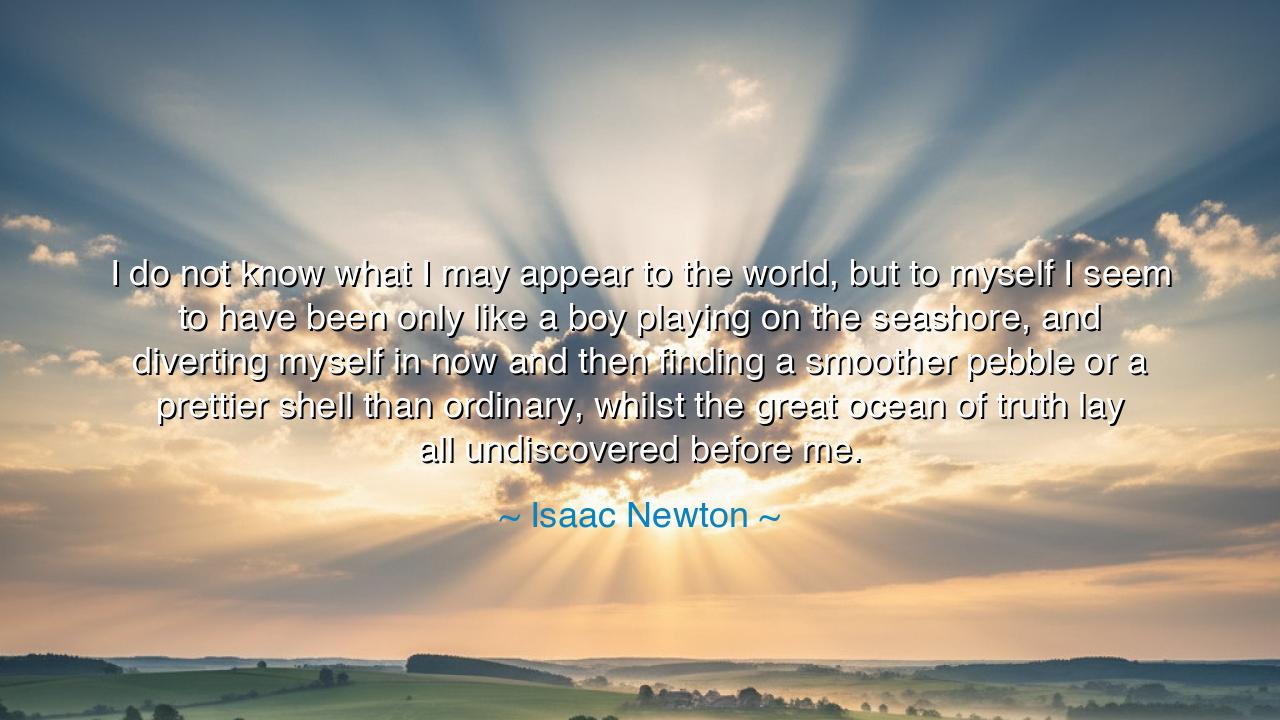
I do not know what I may appear to the world, but to myself I
I do not know what I may appear to the world, but to myself I seem to have been only like a boy playing on the seashore, and diverting myself in now and then finding a smoother pebble or a prettier shell than ordinary, whilst the great ocean of truth lay all undiscovered before me.






Hearken, children of the ages yet to come, and behold the humility and wisdom of Isaac Newton, who reflected: “I do not know what I may appear to the world, but to myself I seem to have been only like a boy playing on the seashore, and diverting myself in now and then finding a smoother pebble or a prettier shell than ordinary, whilst the great ocean of truth lay all undiscovered before me.” In these words lies a timeless meditation on humility, curiosity, and the boundless nature of knowledge. Even the greatest mind acknowledges that what has been discovered is but a small fragment of the infinite ocean of truth.
Newton’s metaphor of the boy on the seashore evokes the image of wonder and playfulness. He likens his profound discoveries—the laws of motion, the theory of gravity—to mere pebbles or shells, small treasures compared to the vast unknown. The ancients often taught that true wisdom arises not from pride, but from recognition of one’s own smallness before the immensity of the cosmos. Socrates, too, proclaimed that he was wise only in knowing that he knew nothing; Newton’s words echo this eternal truth, that curiosity and humility are inseparable companions on the path to understanding.
Even the greatest accomplishments, Newton reminds us, are steps along an unending journey. The boy on the seashore gathers shells, marveling at their shapes and textures, yet the great ocean stretches beyond vision. Similarly, Newton, despite shaping the foundations of physics and mathematics, recognized that the universe holds mysteries yet unrevealed. This awareness is both humbling and empowering: humility guards the mind against arrogance, while curiosity drives it to seek further.
Consider the story of Galileo Galilei, who, observing the heavens through his telescope, discovered moons circling Jupiter, yet humbly acknowledged that he had seen but a fraction of the celestial expanse. Like Newton, Galileo understood that human knowledge is a pebble in the vast seashore of truth. These giants of discovery teach that every achievement is an invitation, not a conclusion, urging each seeker of wisdom to continue exploring with reverence and awe.
Newton’s reflection also reveals the importance of delight and play in the pursuit of knowledge. The boy “diverting himself” captures the joy of discovery, the wonder that fuels study and experimentation. The ancients believed that learning must be coupled with passion and engagement, for the mind that delights in its quest will endure hardship and uncertainty, and its discoveries will carry the richness of lived experience, not mere calculation.
The lesson of this meditation is clear: no matter the heights one reaches, remain conscious of the vast unknown that lies before you. Approach study and life with humility, curiosity, and delight. Celebrate the small discoveries—the pebbles and shells of understanding—but never cease to gaze upon the horizon, where infinite truths await. Such awareness cultivates wisdom, temperance, and a lifelong dedication to the pursuit of knowledge.
Practical guidance emerges naturally from Newton’s words: engage in your work with curiosity, celebrate incremental discoveries, and seek joy in learning. Approach the world with humility, knowing that even the most profound achievements are but glimpses of the greater whole. Remain open to wonder, for the ocean of truth stretches infinitely, offering endless opportunity for insight and growth.
Children of the ages, let Newton’s vision inspire your hearts: embrace the wonder of discovery, honor the limits of your knowledge, and cultivate a spirit of humility, joy, and persistent curiosity. Like the boy on the seashore, find delight in each shell and pebble, but always keep your gaze upon the vast, uncharted ocean that lies before you, for it is there that the true mysteries of the universe wait to be revealed.
If you wish, I can also craft a more lyrical, narrative version, turning Newton’s metaphor into an immersive oral story that evokes the sound of waves and the infinite horizon, perfect for audio narration. Do you want me to do that?






AAdministratorAdministrator
Welcome, honored guests. Please leave a comment, we will respond soon